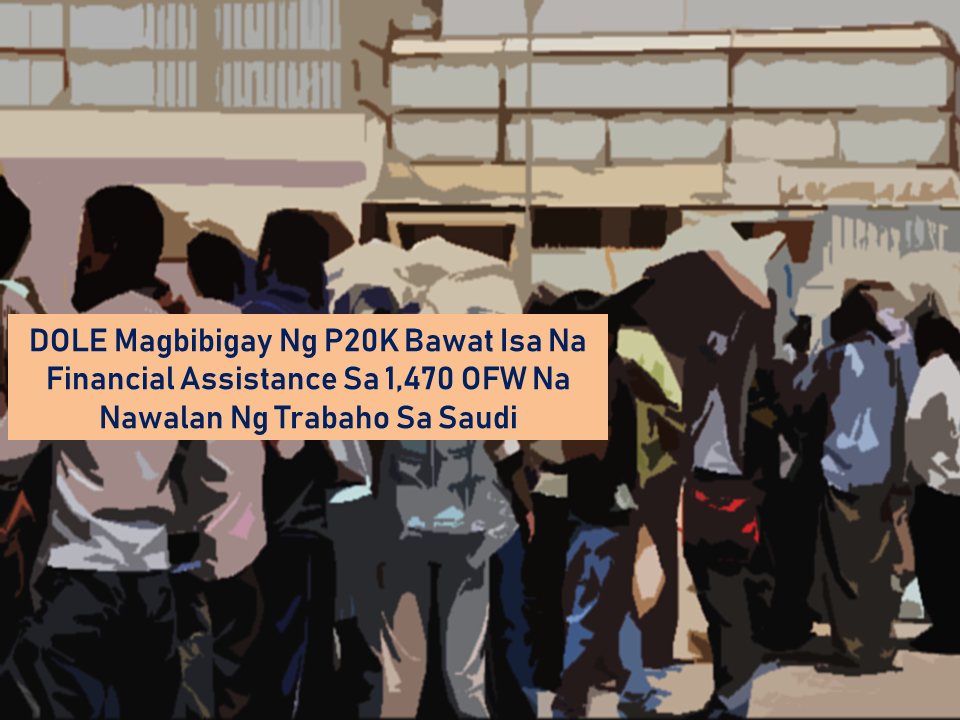In the present rule of the Professional Regulation Commission, all professionals including those who are working abroad as overseas Filipino workers (OFW) are required to undergo CPD training and exams before they can secure or renew their professional license.
“I am confident that the committee on higher and technical education, through this technical working group, will immediately thresh out the important issues regarding this Continuing Professional Development Act,” said one of the author of the bill which seek to repeal or change the “Continuing Professional Development Act of 2016” or Republic Act 10912.
“I am confident that the committee on higher and technical education, through this technical working group, will immediately thresh out the important issues regarding this Continuing Professional Development Act,” said one of the author of the bill which seek to repeal or change the “Continuing Professional Development Act of 2016” or Republic Act 10912.
Ads
Sponsored Links
The panel, chaired by Antique Rep. Paolo Everardo Javier, created a technical working group (TWG) to draft a substitute bill on measures seeking to amend or repeal Republic Act 10912 or the “Continuing Professional Development Act of 2016”.
“The law should be amended or even repealed for the sake of our OFWs and local professionals,” Ako Bicol party-list Rep. Rodel Batocabe, one of the authors of the bill, said.
Batocabe, along with fellow Ako Bicol Party-list Reps. Alfredo Garbin, Jr. and Christopher Co filed House Bill 6461 seeking to exempt overseas Filipino workers (OFWs) from the continuing professional development requirements in the renewal of their license under the Professional Regulation Commission (PRC).
“I am merely voicing out the sentiments of our constituents, particularly OFWs who are unduly burdened by this requirement of a mandatory Continuing Professional Development in order to renew their professional license,” Batocabe said.
He said OFW professionals already undergo professional development in their employment or by their employers abroad.
“So, requiring them to undergo another continuing professional development here, for purposes of license renewal, is already excessive,” Batocabe said.
“Another thing is, during the period when OFWs work abroad, they are in fact outside the jurisdiction of the PRC, so it would be absurd if their license renewal should be subject to the requirements of the PRC while these OFWs are abroad,” he added.
ACT Teachers party-list Rep. Antonio Tinio and Bayan Muna party-list Rep. Carlos Isagani Zarate insisted that RA 10912 should be repealed, citing that its implementation has imposed multiple, logistical and psychological burdens on professionals especially to nurses and teachers.
For his part, Quezon City Rep. Winston Castelo described as burdensome the practice of continuing professional development not only to the OFWs but to all licensed professionals.
Under the law, PRC undertakes the overall implementation of the CPD programs together with the Professional Regulatory Boards (PRBs).
Filed under the category of technical education, Continuing Professional Development Act of 2016, Professional Regulatory Commission, CPD, overseas Filipino workers (OFW), working abroad.
Ads
©2018 THOUGHTSKOTO
















![Is P50,000 Enough for OFWs' 3-Week Vacation in the Philippines? After a year or two of working abroad, a well-deserved vacation is the most awaited part of every Overseas Filipino Workers (OFWs). Not just for OFWs but also their families are looking forward to these days to come. For many OFWs, if not all, vacationing in the Philippines is like a feast — non-stop eating, drinking, shopping, and catching up with family and friends. But for some, going back in the country is also worrying about relatives and neighbors asking for money and "pasalubongs" from abroad especially if you don't have enough fund to spend on vacation. But how much money OFW should have when vacationing in the Philippines for three weeks or a month? Is P50,000 enough? One OFW narrates on Reddit about his recent vacation in the Philippines and talks about his frustrating experience when he visited his relatives in the country. The Reddit user came under the name of "crazy4dcoffee" who lives in the USA. Recently, he paid a three-week vacation to the Philippines with his grandmother and was given a $1,000 allowance by his parents to spend during his stay in the country. He thought that the pocket money is a bit too much but when he meets his relatives, he found out that he was wrong. “[For two weeks], I stayed with my mom’s sister and her family. Now let me tell you this – the block that my aunt lives on – their cousins, and other second and third cousins live there. Some of them I have no idea who they are but my luggage was packed with gifts for these people and also cash,” He said that he immediately lost P11,000 from his pocket money because of the cash he gave his Filipino relatives. “Now I had P39,000 left. I still had 17 days left. I thought it would last me but no it did not,” he said. He even got mad when some of his relatives asked him to pay for their electricity bills and tuition fees. Not only this because some of his relatives would put him in a difficult situation by asking money from him in front of everyone else so that he won’t be able to refuse. Some are also stealing instead of asking money and other items from him. “I’m not trying to make it look like all Filipino relatives are like this, but why do you think just because I’m from abroad, I am mayaman or rich like why can’t I just be me? Of course, I have money. I’m on a foreign land on vacation. But it does not make me a walking bank account,” he said. “Also hate when they guilt trip you for not giving money and tell sob stories so you feel bad and give in,” he added. The Reddit user even recalled times that his relatives invited him to eat outside, but asked him to pay for their meal for 12 people. He also talked about ungrateful relatives who cannot be happy with his pasalubong because of the shoes she wants is not there. “Also, my mom’s sister got a lot of clothes. She got two shorts, t-shirts, and even some chocolates, but got mad at me because the shoes she requested wasn’t there. I had to explain to her that I had no more space in my luggage and that she got a lot already, it won’t be fair. She said next time we go home she expects the shoes. My blood was boiling to the max,” he said “I hate that I feel this way but why are some relatives such parasites,” he said at the end of his post. Indeed, for OFWs, it is stressful and frustrating to have relatives that treat you like an ATM just because you are working abroad. So for OFWs who are heading home, do not tolerate these traits and slowly educate your family members and relatives that working abroad is not an easy job. Also, learn to say "No" when someone asks for this and that. Remember you don't have to give in to everyone's demand. Set your budget when vacationing home because no amount of money is enough if "party here and party there" is the situation on your vacation.](https://blogger.googleusercontent.com/img/b/R29vZ2xl/AVvXsEg4-_nBUCUK-WvbvFs1uteCfF1nupcZ8YRYu08muga6IrxL-D-ygf_GyX9qPjvMMHyJgyTKqEb16zBzlWTlzoE-0_xM_UPwaxDqA_6uVPXEHskPyOCL7e9m8-Jps-fVuKTm_xvo/s1600/hjgjhgf.jpg)
![Is P50,000 Enough for OFWs' 3-Week Vacation in the Philippines? After a year or two of working abroad, a well-deserved vacation is the most awaited part of every Overseas Filipino Workers (OFWs). Not just for OFWs but also their families are looking forward to these days to come. For many OFWs, if not all, vacationing in the Philippines is like a feast — non-stop eating, drinking, shopping, and catching up with family and friends. But for some, going back in the country is also worrying about relatives and neighbors asking for money and "pasalubongs" from abroad especially if you don't have enough fund to spend on vacation. But how much money OFW should have when vacationing in the Philippines for three weeks or a month? Is P50,000 enough? One OFW narrates on Reddit about his recent vacation in the Philippines and talks about his frustrating experience when he visited his relatives in the country. The Reddit user came under the name of "crazy4dcoffee" who lives in the USA. Recently, he paid a three-week vacation to the Philippines with his grandmother and was given a $1,000 allowance by his parents to spend during his stay in the country. He thought that the pocket money is a bit too much but when he meets his relatives, he found out that he was wrong. “[For two weeks], I stayed with my mom’s sister and her family. Now let me tell you this – the block that my aunt lives on – their cousins, and other second and third cousins live there. Some of them I have no idea who they are but my luggage was packed with gifts for these people and also cash,” He said that he immediately lost P11,000 from his pocket money because of the cash he gave his Filipino relatives. “Now I had P39,000 left. I still had 17 days left. I thought it would last me but no it did not,” he said. He even got mad when some of his relatives asked him to pay for their electricity bills and tuition fees. Not only this because some of his relatives would put him in a difficult situation by asking money from him in front of everyone else so that he won’t be able to refuse. Some are also stealing instead of asking money and other items from him. “I’m not trying to make it look like all Filipino relatives are like this, but why do you think just because I’m from abroad, I am mayaman or rich like why can’t I just be me? Of course, I have money. I’m on a foreign land on vacation. But it does not make me a walking bank account,” he said. “Also hate when they guilt trip you for not giving money and tell sob stories so you feel bad and give in,” he added. The Reddit user even recalled times that his relatives invited him to eat outside, but asked him to pay for their meal for 12 people. He also talked about ungrateful relatives who cannot be happy with his pasalubong because of the shoes she wants is not there. “Also, my mom’s sister got a lot of clothes. She got two shorts, t-shirts, and even some chocolates, but got mad at me because the shoes she requested wasn’t there. I had to explain to her that I had no more space in my luggage and that she got a lot already, it won’t be fair. She said next time we go home she expects the shoes. My blood was boiling to the max,” he said “I hate that I feel this way but why are some relatives such parasites,” he said at the end of his post. Indeed, for OFWs, it is stressful and frustrating to have relatives that treat you like an ATM just because you are working abroad. So for OFWs who are heading home, do not tolerate these traits and slowly educate your family members and relatives that working abroad is not an easy job. Also, learn to say "No" when someone asks for this and that. Remember you don't have to give in to everyone's demand. Set your budget when vacationing home because no amount of money is enough if "party here and party there" is the situation on your vacation.](https://blogger.googleusercontent.com/img/b/R29vZ2xl/AVvXsEh_GPGzzrT7WtF91G5MPxt2g_dQrBbWpb0LoGCTqgHce_R7ZQPd6-x3ykZzyau37PQY3V9bCm5N7ciimzv0lyD6BcfWjrsCPgQ-V_euh-cS7zbbXF6Tjr-nHAAGhwMxNhkO78FC/s1600/Slide1.JPG)
![Is P50,000 Enough for OFWs' 3-Week Vacation in the Philippines? After a year or two of working abroad, a well-deserved vacation is the most awaited part of every Overseas Filipino Workers (OFWs). Not just for OFWs but also their families are looking forward to these days to come. For many OFWs, if not all, vacationing in the Philippines is like a feast — non-stop eating, drinking, shopping, and catching up with family and friends. But for some, going back in the country is also worrying about relatives and neighbors asking for money and "pasalubongs" from abroad especially if you don't have enough fund to spend on vacation. But how much money OFW should have when vacationing in the Philippines for three weeks or a month? Is P50,000 enough? One OFW narrates on Reddit about his recent vacation in the Philippines and talks about his frustrating experience when he visited his relatives in the country. The Reddit user came under the name of "crazy4dcoffee" who lives in the USA. Recently, he paid a three-week vacation to the Philippines with his grandmother and was given a $1,000 allowance by his parents to spend during his stay in the country. He thought that the pocket money is a bit too much but when he meets his relatives, he found out that he was wrong. “[For two weeks], I stayed with my mom’s sister and her family. Now let me tell you this – the block that my aunt lives on – their cousins, and other second and third cousins live there. Some of them I have no idea who they are but my luggage was packed with gifts for these people and also cash,” He said that he immediately lost P11,000 from his pocket money because of the cash he gave his Filipino relatives. “Now I had P39,000 left. I still had 17 days left. I thought it would last me but no it did not,” he said. He even got mad when some of his relatives asked him to pay for their electricity bills and tuition fees. Not only this because some of his relatives would put him in a difficult situation by asking money from him in front of everyone else so that he won’t be able to refuse. Some are also stealing instead of asking money and other items from him. “I’m not trying to make it look like all Filipino relatives are like this, but why do you think just because I’m from abroad, I am mayaman or rich like why can’t I just be me? Of course, I have money. I’m on a foreign land on vacation. But it does not make me a walking bank account,” he said. “Also hate when they guilt trip you for not giving money and tell sob stories so you feel bad and give in,” he added. The Reddit user even recalled times that his relatives invited him to eat outside, but asked him to pay for their meal for 12 people. He also talked about ungrateful relatives who cannot be happy with his pasalubong because of the shoes she wants is not there. “Also, my mom’s sister got a lot of clothes. She got two shorts, t-shirts, and even some chocolates, but got mad at me because the shoes she requested wasn’t there. I had to explain to her that I had no more space in my luggage and that she got a lot already, it won’t be fair. She said next time we go home she expects the shoes. My blood was boiling to the max,” he said “I hate that I feel this way but why are some relatives such parasites,” he said at the end of his post. Indeed, for OFWs, it is stressful and frustrating to have relatives that treat you like an ATM just because you are working abroad. So for OFWs who are heading home, do not tolerate these traits and slowly educate your family members and relatives that working abroad is not an easy job. Also, learn to say "No" when someone asks for this and that. Remember you don't have to give in to everyone's demand. Set your budget when vacationing home because no amount of money is enough if "party here and party there" is the situation on your vacation.](https://blogger.googleusercontent.com/img/b/R29vZ2xl/AVvXsEgwoojW1ncz-AhCvbx6vg53YQgyZaUSJXBvRhYiZ2fbVYUPwWGaeijvTiZUGH9s4Co3nULvElfVMylFFZBR5lWZMyh4H5lDwe8hvsDf5ICHR4ZZhkriiQCTqIH0_rN2OzrL8pUU/s1600/Slide2.JPG)
![Is P50,000 Enough for OFWs' 3-Week Vacation in the Philippines? After a year or two of working abroad, a well-deserved vacation is the most awaited part of every Overseas Filipino Workers (OFWs). Not just for OFWs but also their families are looking forward to these days to come. For many OFWs, if not all, vacationing in the Philippines is like a feast — non-stop eating, drinking, shopping, and catching up with family and friends. But for some, going back in the country is also worrying about relatives and neighbors asking for money and "pasalubongs" from abroad especially if you don't have enough fund to spend on vacation. But how much money OFW should have when vacationing in the Philippines for three weeks or a month? Is P50,000 enough? One OFW narrates on Reddit about his recent vacation in the Philippines and talks about his frustrating experience when he visited his relatives in the country. The Reddit user came under the name of "crazy4dcoffee" who lives in the USA. Recently, he paid a three-week vacation to the Philippines with his grandmother and was given a $1,000 allowance by his parents to spend during his stay in the country. He thought that the pocket money is a bit too much but when he meets his relatives, he found out that he was wrong. “[For two weeks], I stayed with my mom’s sister and her family. Now let me tell you this – the block that my aunt lives on – their cousins, and other second and third cousins live there. Some of them I have no idea who they are but my luggage was packed with gifts for these people and also cash,” He said that he immediately lost P11,000 from his pocket money because of the cash he gave his Filipino relatives. “Now I had P39,000 left. I still had 17 days left. I thought it would last me but no it did not,” he said. He even got mad when some of his relatives asked him to pay for their electricity bills and tuition fees. Not only this because some of his relatives would put him in a difficult situation by asking money from him in front of everyone else so that he won’t be able to refuse. Some are also stealing instead of asking money and other items from him. “I’m not trying to make it look like all Filipino relatives are like this, but why do you think just because I’m from abroad, I am mayaman or rich like why can’t I just be me? Of course, I have money. I’m on a foreign land on vacation. But it does not make me a walking bank account,” he said. “Also hate when they guilt trip you for not giving money and tell sob stories so you feel bad and give in,” he added. The Reddit user even recalled times that his relatives invited him to eat outside, but asked him to pay for their meal for 12 people. He also talked about ungrateful relatives who cannot be happy with his pasalubong because of the shoes she wants is not there. “Also, my mom’s sister got a lot of clothes. She got two shorts, t-shirts, and even some chocolates, but got mad at me because the shoes she requested wasn’t there. I had to explain to her that I had no more space in my luggage and that she got a lot already, it won’t be fair. She said next time we go home she expects the shoes. My blood was boiling to the max,” he said “I hate that I feel this way but why are some relatives such parasites,” he said at the end of his post. Indeed, for OFWs, it is stressful and frustrating to have relatives that treat you like an ATM just because you are working abroad. So for OFWs who are heading home, do not tolerate these traits and slowly educate your family members and relatives that working abroad is not an easy job. Also, learn to say "No" when someone asks for this and that. Remember you don't have to give in to everyone's demand. Set your budget when vacationing home because no amount of money is enough if "party here and party there" is the situation on your vacation.](https://blogger.googleusercontent.com/img/b/R29vZ2xl/AVvXsEj66b5C71ISQg6MaOJZO_20nCmE2-stJzoTIoIpdmQ3TJR7T-kMn-JvQfh3_hlqI3QgeYlHZdxV6pWgj9s6F47ahVVwzZF1aeVfzKoWnS_83NLQuAfVDBU7rSBf4QYMifsfTA4p/s1600/Slide3.JPG)







